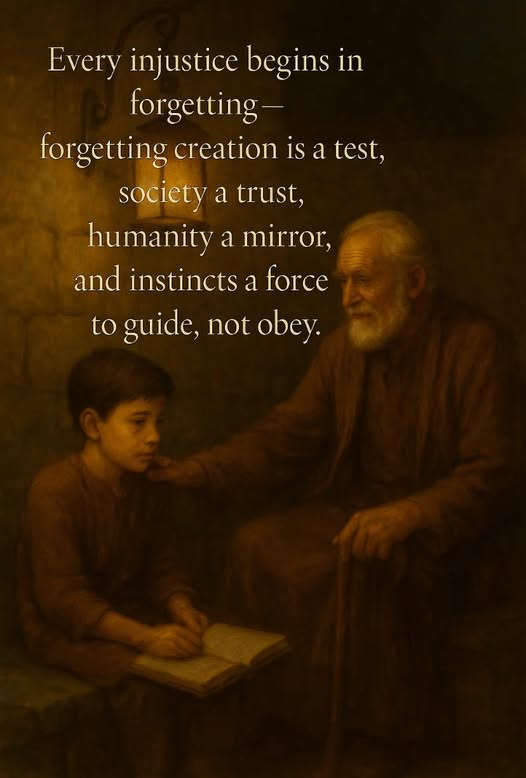
It was a quiet evening in the courtyard. A gentle breeze stirred the lantern above, casting flickering shadows along the old stone walls. Emil sat on the bench, notebook open but untouched, his brow furrowed in thought.
Grandfather sipped his tea beside him. “You’re unusually quiet today.”
“I’m trying to understand why people keep making the same mistakes,” Emil said. “We fight, we destroy, we divide… over and over. Don’t we learn?”
Grandfather leaned back, eyes thoughtful. “We learn some things, Emil—but we often ignore the roots.”
He tapped his cane gently on the stone floor. “Do you know what lies at the heart of most human-created problems?”
Emil shook his head.
“Four absences,” Grandfather said, holding up four fingers. “And each one pulls us further from peace.”
He raised his first finger. “The first blind spot is a lack of comprehension about the fundamental principles on which this world is created. Many forget that life is not designed for perpetual ease, but as a test—a terrain of trials, of temporary highs and lows, where joy and suffering serve a greater purpose. This world is not the destination; it is the passage. Understanding the temporary nature of life and the concept of divine accountability on the Day of Judgment brings clarity. It transforms suffering into patience, success into humility, and failure into courage. When we forget this, we chase permanence in a transient world, and despair when we find none.”
The second finger. “The second is a failure to grasp the core values upon which societies must be built—justice, mercy, cooperation, trust, and dignity. Without these, civilizations collapse—not always physically, but spiritually and ethically. A society without shared values becomes a marketplace of individual desires, where the loudest and strongest prevail, and the most vulnerable suffer in silence.”
The third finger. “The third is not understanding the human being—our identity, our emotional depth, and our desire for meaning and respect. When we ignore these, we reduce people to numbers or stereotypes. To respect the complexity of each soul, and to recognize the dignity of others, is to honor what makes us truly human.”
And the fourth. “Finally, many remain unaware of the primal instincts hardwired into us: the longing for love, safety, recognition, and purpose. When these instincts are ignored or manipulated—by systems, leaders, or even our own unawareness—they become distorted forces that drive conflict, greed, and division. But when they are understood and guided with wisdom, they lead to flourishing communities and inner fulfillment.”
Emil looked down. “So… every war, every injustice, every broken family… it all starts from forgetting these?”
“Exactly,” Grandfather said. “When we forget the wisdom of creation, we abuse the world. When we forget society’s values, we create systems of inequality. When we forget our own nature, we violate one another’s dignity. And when we ignore our instincts, they control us from the shadows.”
He placed a hand on Emil’s shoulder. “But knowledge restores balance. Comprehension is the cure. The more we learn about these four dimensions, the more we see the patterns—and the more human we become. The solution is not just reforming policy or changing leadership; it is reviving understanding. When we restore knowledge in these four dimensions, we begin to repair not just the outer world—but the world within.”
Emil closed his notebook slowly. “So the answer isn’t just more information… it’s deeper understanding.”
Grandfather smiled. “Exactly. Knowledge that humbles, not inflates. Wisdom that connects, not divides.”
The lantern above them swayed once more, casting light into the corners of the courtyard.
And in Emil’s heart, a quiet resolve began to glow—to seek, to listen, and to understand.

